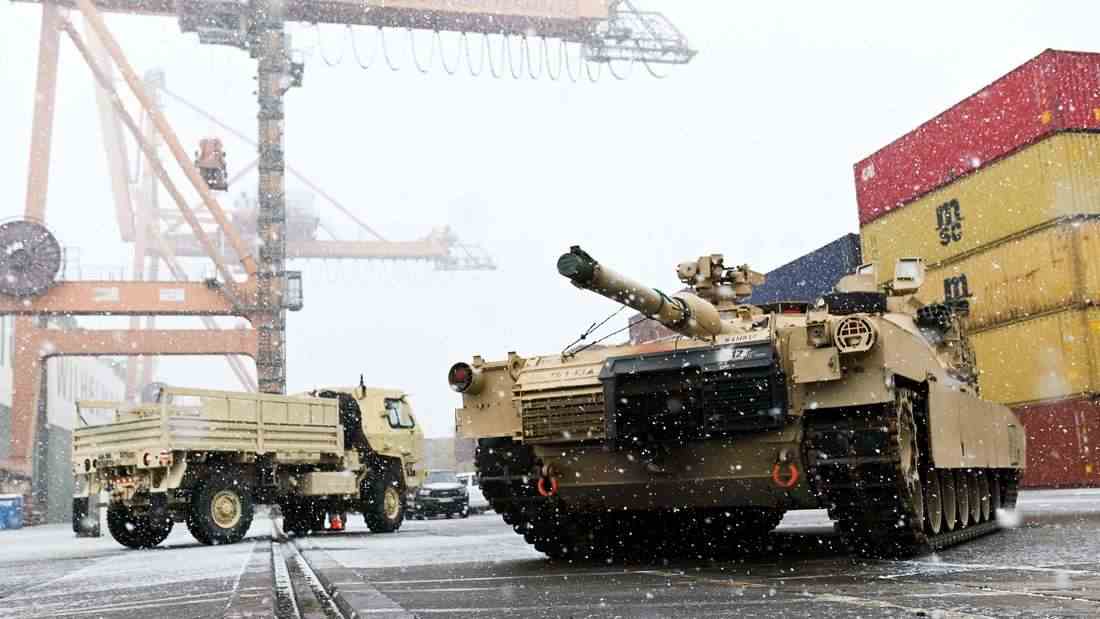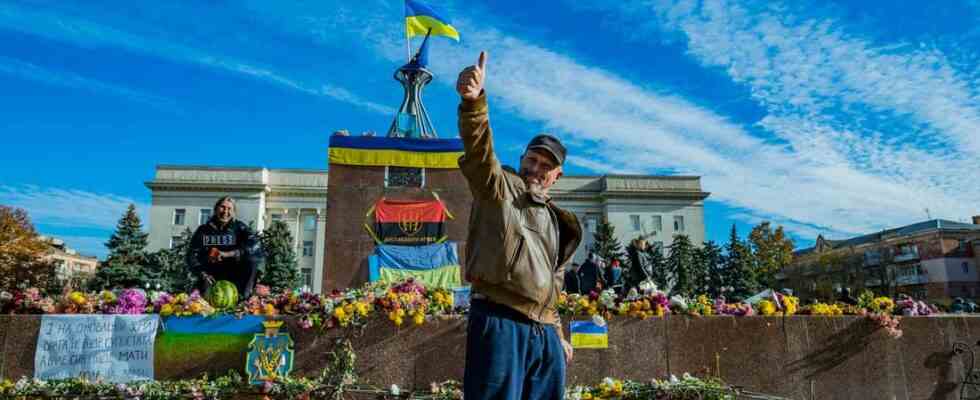The US does not want to supply Abrams. At the NATO meeting in Ramstein, however, they emphasized the urgency of providing Ukraine with weapons. The news ticker.
- Military Aids: Germany has not yet declared delivery of Leopard 2.
- NATO meeting: In Ramstein, it could be decided whether Germany will take the Leopard in Ukraine war delivers.
- Moscow reacts: Kremlin warns West against arms deliveries to Ukraine.
+++ 2.20 p.m.: Before NATO met in Ramstein, Russian President Vladimir Putin convened the permanent members of his Security Council for an operational meeting to discuss the course of the aggressive war in Ukraine. “The participants exchanged views on the course of the special military operation. Defense Minister Sergei Shoigu informed the participants about his visit to the headquarters of the operation earlier in the week,” said Russian press secretary Dmitry Peskov.
+++ 2 p.m.: At the defense ministers’ meeting in Ramstein, no decision has yet been made on the delivery of “Leopard” battle tanks. This was stated by Federal Defense Minister Boris Pistorius at the US air force base there. But this morning he ordered his ministry to carry out an audit of the stocks of “Leopard” tanks, Pistorius said.
+++ 1.15 p.m.: At the start of the Ukraine Contact Group meeting in Ramstein, the United States and Ukraine stressed the urgency of further military aid in the war against Russia. The Federal Ministry of Defense declared that Germany was “fully committed to Ukraine’s defense” against the Russian war of aggression. The Ministry published a photo of the new Defense Minister Boris Pistorius (SPD) in conversation with his British counterpart Ben Wallace on Twitter.

+++ 12.30 p.m.: At the start of the meeting of the so-called Ukraine contact group in Ramstein, Ukrainian President Volodymyr Zelenskyy called for more urgency in the arms deliveries. The war started by Russia “allows no delay,” Zelenskyy said via video link on Friday morning at the meeting at the US Ramstein Air Force Base in Rhineland-Palatinate. Time remains “a Russian weapon”. Zelenskyy thanked the participants of the meeting for their already provided military aid. But “Hundreds of thanks are not hundreds of tanks,” he added. “Thousands of words” would not help against Russian artillery, the Ukrainian president clarified. With the help of the allies, Ukraine could “actually win”.
Tanks for Ukraine: Ramstein conference as a “decisive moment”?
+++ 11.00 a.m.: At the start of the Ukraine Contact Group meeting in Ramstein, US Secretary of Defense Lloyd Austin called for efforts to further intensify support for Ukraine to ward off Russian war of aggression. Ukraine’s fight against the Russian invasion is currently at a “decisive moment,” Austin said on Friday morning at the US Ramstein Air Force Base in Rhineland-Palatinate. It is therefore not the time to let up.
+++ 10.15 a.m.: Ahead of the Ramstein conference, Finland pledged another €400 million worth of military aid to Ukraine, including heavy artillery and ammunition. Finnish Defense Minister Mikko Savola said Ukraine still needs “support to defend its territory”. His ministry did not provide any details on the military aid, special adviser Miikka Pynnönen told the news agency AFP however, it does not contain Leopard tanks.
Battle tanks for the Ukraine: USA does not deliver – Germany still undecided
Update from January 20, 6:30 a.m.: The Pentagon in the US published a list of extensive arms deliveries on Thursday evening (local time). The package includes, among other things, 59 Bradley infantry fighting vehicles and, for the first time, 90 Stryker wheeled infantry fighting vehicles – but no Abrams main battle tanks.
Federal Defense Minister Pistorius stated that the delivery of US Abrams battle tanks to Ukraine was not a condition for the possible dispatch of German battle tanks: “I’m not aware of such a link,” said the SPD politician in an ARD “Focal Point”. . When asked if Germany would supply main battle tanks without the US, Pistorius said that was an issue Scholz was discussing with US President Joe Biden.
Tanks for Ukraine: Pentagon currently sees Abrams delivery as “not sensible”.
+++ 9.45 p.m.: From the point of view of the US Department of Defense, a delivery of American Abrams main battle tanks to Ukraine “at this point in time” makes little sense. Pentagon spokeswoman Sabrina Singh said according to one dpareport to journalists in Washington. The reason for this assessment is that the Abrams main battle tank would be more difficult to use and maintain in Ukraine due to the fuel required. Also the US newspaper political had already reported on Wednesday (January 18) that Washington probably does not plan to supply Abrams tanks, but instead is considering the supply of Stryker wheeled armored personnel carriers.
The news comes after reports of a phone call between German Chancellor Olaf Scholz and US President Joe Biden, in which Scholz asked Biden to also supply Abrams tanks in the event of a German Leopard delivery. The new Defense Minister Boris Pistorius, who was sworn in on Thursday, emphasized in the evening ARDthat the possible Leopard delivery was not directly related to the delivery of US tanks.
England supplies Brimstone missiles
+++ 6.30 p.m.: “Today I can announce that we will send 600 Brimstone missiles, which will be very important for Ukraine’s battlefield dominance,” British Defense Minister Ben Wallace announced in Estonia.
When visiting the British-led NATO battalion, he announced the delivery of 14 Challenger 2 tanks. It has not yet been communicated when the deliveries will be made.
Update from Thursday, January 19, 7:00 a.m.: The United States is demanding from Germany that the Chancellery not only allow other countries to supply Leopard 2 main battle tanks, but also supply them itself. That reports the Southgerman newspaper. On Thursday, US Secretary of Defense Lloyd Austin will come to Berlin for talks with his new German counterpart, Boris Pistorius (SPD).
Negotiations in the Ukraine war: Kissinger speaks in Davos about Ukraine’s NATO membership
First report from Wednesday, January 18: Kyiv/Moscow/Davos – While in the Ukraine the Russian war of aggression continued unabated and with toughness, politicians and business representatives meet at the World Economic Forum in Davos. The dominant topic is the war in Ukraine. During US President Joe Biden does not take part in the forum becomes Federal Chancellor Olaf Scholz (SPD) to give a speech to the plenum of the meeting on Wednesday afternoon. It is eagerly awaited whether he will comment on possible tank deliveries to Kyiv.
Former US Secretary of State Henry Kissinger spoke in Davos on Tuesday (January 17). His change of opinion on the subject of Ukraine and NATO accession after the Russian invasion was surprising to observers. “Before this war, I was against Ukraine’s membership because I feared it could start the very process we are seeing now,” Kissinger said via video link at the World Economic Meeting (WEF). Under the current conditions, “the idea of a neutral Ukraine no longer makes sense,” said the 99-year-old.
For months, the longtime top diplomat had spoken out in favor of a ceasefire in Ukraine that would have gone hand in hand with the recognition of Russian territorial gains. But in his message to the WEF, Kissinger now said that NATO membership would be an “appropriate consequence” of the Russian invasion.
Negotiations in the Ukraine war: Russia holds UN Security Council meeting on Ukraine
While the global crises are being debated in Davos, a Russian envoy to the United Nations announced Moscow’s reaction to the criticism Ukraine conflict on. As Newsweek reports, an informal meeting is planned in the UN Security Council, in which the “anti-Russian attitude” will be discussed. The portal quotes Russia’s first deputy representative to the United Nations, Dmitry Polyanskiy, as making fun of “Western sponsors of Ukraine”. Members of the United Nations would take an “anti-Russian” stance “once a month” when discussing the war.
Finally, he issued a warning about the forthcoming UN meetings and formulated: “I will not go into detail about what will happen at our suggestion in the Security Council early next week.” The “opponents” of Russia should therefore “remain in the dark”, he said, adding that after an “anti-Russian” session, an attempt will be made to organize a session on a topic “that is uncomfortable for them”. (talk with agencies)

